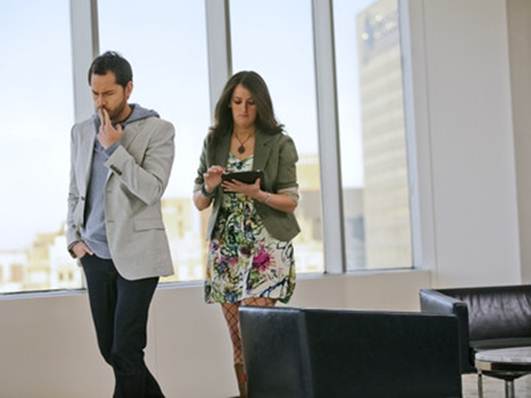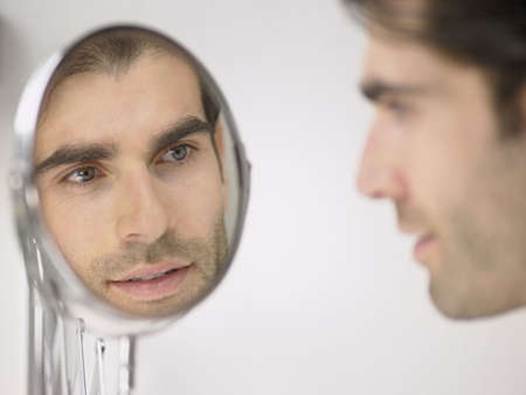Pete, now 39, went through exactly this
crisis. Just a week shy of his 30th birthday, he left his long-term
job, and a woman he still describes as “the love of my life”.
“Looking back, there was just so much
loaded into that birthday,” he says. “That little zero adds so much
significance. I guess it’s a landmark, a time to take serious stock. I was
unhappy and my girlfriend became a totem of that. I’m embarrassed to say it,
but she was the easiest thing to change.” Clare, now 28, dated a 29 year old on
the same postgrad course six years ago. “It was one of those intense
connections,” she says. “All was going A-OK until one morning he said he’d seen
a glimpse of his future – and I wasn’t in it. He was the classic Peter Pan guy:
I think he genuinely thought he was George Clooney.”

he
left his long-term job, and a woman he still describes as “the love of my
life”.
Last year, Anna, a 29 year old from
Manchester, had a similar experience. “I met Mark on match.com and we had so
much in common,” she says. “On date four, he asked when he could meet my
parents – it was full steam ahead.” That was until date seven, just after
Mark’s 29th birthday. “The second I walked in, I could tell there’d
been a shift. He told me something awful had happened: he’d found a grey hair.
Then he went on a massive rant: ‘I don’t have enough Twitter followers, I need
a new job, I’m nearly 30!’ He texted me a few days later telling me he just
wanted to focus on him right now.”
Dr Nicole Gehl, a psychotherapist, believes
that this overreaction to the physical signs of ageing hints at something more
fundamental in play here: the elusive male body clock.
“Primarily, this is a psycho-sociological
phenomenon,” she says. “But there are physical factors too. Men are looking in
the mirror and these first grey hairs are appearing. It’s harder to lose weight
and hangovers are becoming worse. We’re conditioned to have these great
expectations for our lives in terms of self-fulfilment, happiness and
achievement – and then 30 hits. Men reflect on their decisions and are shocked
out of their equilibrium as it becomes clear what trade-offs have been made in
the run-up to this point.”
The crucial difference between the sexes,
says Dr Gehl, is that women are socialized to talk more openly about their
feelings and, as a result, approach their thirties with a far more optimistic,
balanced outlook.
“Without that dialogue, the difficult
questions, like, ‘What do I want from life?’ or ‘Why am I living like this?’
don’t surface until the balances is disrupted,” she says. In other words, men
will happily bottle it all up in the extended adolescence of their twenties –
only for the heat of an impending 30th to melt the entire waxwork.

Men
are looking in the mirror and these first grey hairs are appearing
The latter is an experience Joe, 31, a
banker, experienced first-hand. After ten years with his live-in girlfriend,
Emma, he ended the relationship after he hit 29. He only confessed the true
reason to her four months later: he was gay.
“It was an incredibly upsetting time,” says
Joe. “I’d wake up worrying about it and go to bed worrying about it. I was
miserable. We were best friends, and we’d had fun all through our twenties, but
29 was a wake-up call. I’d tried all these little things to make us happy, but
I knew I’d never be able to give her 100 in terms of marriage, kids and a
future. You ignore it and ignore it, until you can’t ignore it any more. The
impending certainty of 30 was the catalyst to do something about it.”
Divorce lawyer Richard Collins has
witnessed this growing trend. He describes the “harsh reality of
responsibility” hitting men in the face at this stage “like a swinging saloon
door”. For those already married by 29, it’s often a knockout blow.
“This stage is second only to the early
forties in terms of divorce,” he says. “And most of the 42 and 43 year olds can
trace back their unhappiness to this point too.”
So what can you do if your other half is 28
and counting? The solution, according to Dr Gehl, is to loosen the reins a
little.
“You need to be as tolerant as you can if
your partner is going through something like this, remain emotionally strong
and realize it is completely normal,” says Dr Gehl. “Ultimately, this is
existential anxiety. Be supportive and be a friend, while at the same time
keeping your boundaries. And never give an ultimatum unless you’re willing to
follow through on it.”
After all, the Catch 29 might not be such a
bad thing. As Richard Collins points out, many of those who do weather
the storm and stay together will end up unhappily married. It might be a thorny
life stage, but the irony of 29 is that it is truly a prime number: both sexes
are still at their very peak. Better to discover you’re on the wrong route now
than end up breaking down much later, with both of you standing on the hard
shoulder waiting for assistance at Junction 42.